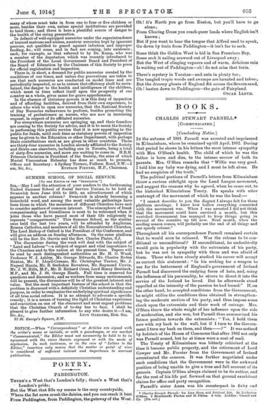SUMMER SCHOOL OF SOCIAL SERVICE. ETo sax Enrron or ran
"Srsorarea"1 Sus,—May I call the attention of your readers to the forthcoming United Sunimer School of Social Service Unions, to be held at Swanwick from June 20th to 29th, an advertisement of which appears in another column? Swanwick is already becoming a household word, and among the most valuable gatherings have been those in which the members of different Churches have met to consider matters of common interest. The atmosphere of frank companionship and friendliness is most to be welcomed when it joins those who have passed most of their life religiously in separate "compartments." This Summer School, as the similar ones held the last two years, will be attended by Anglicans, Roman Catholics, and members of all the Nonconformist Churches. The Lord Bishop of Oxford is the President of the Conference, and will give an address on Sunday afternoon. On the same platform will be the Rev. Dr. Garvie and the Rev. Charles Plater, S.J. The discussions during the week will deal with the subject of "Land and Labour"—a subject of urgent and vital importance to the Churches and to the nation at the present time. Papers will be read by such distinguished authorities as Mr. H. G. Wood, Professor W. J. Ashley, Mr. George Edwards, Mr. Charles Roden Buxton, Mr. P. Lloyd-Creame, Mr. Christopher Turner, Mr. J. Nugent Harris, Mr. B. Seebohm Rowntree, Mr. Raymond Unwin, Mr. J. W. Hills, M.P., Mr. E. Richard Cross, Lord Henry Bontinck, M.P., and Mr. J. St. George Heath. Full time is reserved for questions and discussion; and as workers from many environments will be present, the discussions will be of the greatest interest and value. But the most important feature of the school is that the problem is discussed with a definitely Christian understanding and purpose, in order to emphasize thwunderlying spiritual significance of all true social reform. It is no attempt to advocate a specific remedy; it is a means of turning the light of Christian experience and conviction on one of the obscurest and most urgent problems that the Christian Church of to-day has to face. I shall be pleased to give further information to any who desire it —I am,










































 Previous page
Previous page